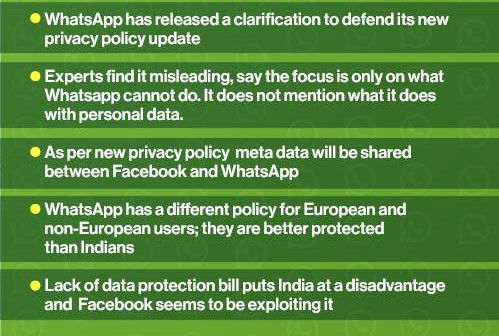WhatsApp Privacy Controversy and India’s Data Protection Laws



WhatsApp, Facebook-owned company, is bringing some major changes to its privacy policy which the users now have to accept else they may lose out on important and some very basic features of Whatsapp. WhatsApp on Monday told the Delhi high court that its new contentious privacy policy has not been deferred and came into action from May 15th. It said that the accounts not complying with the updated policy won’t be deleted immediately although the deadline for the policy to come into effect has not been extended.

“We are still trying to convince consumers but if they don’t accept, gradually their accounts will be deleted. There is no such deadline for this,” senior advocate Kapil Sibal, representing the accused company, said. The Centre, in response, believes that the new privacy policies of the app violates the Indian Information Technology (IT) Act, 2000 and asked the social media platform not to bring in any changes for time-being. Additional Solicitor General (ASG) Chetan Sharma, representing the Centre added that the government has written to Facebook’s chief executive Mark Zuckerberg with respect to this issue on 18th May 2021 and a reply is awaited.

A WhatsApp spokesperson told Mint, an Indian financial daily newspaper published by HT Media ” We’ve spent the last few months working to clear up confusion and misinformation. As a reminder this update does not impact the privacy of personal messages for anyone. Our goal is to provide information about new options we are trying to build that people will have, to message a business on WhatsApp, in the future. While the majority of users who have received the new terms of service have accepted them, we appreciate some people haven’t had the chance to do so yet.”

In order to honour the Fundamental Right to Privacy, it is vital for the concerned platforms to provide transparency regarding its policies to make sure that a well-equipped and protective mechanism is set in force to deal with instances of data protection infringement in India.

It is also crucial to formulate a structure which revolves around the PDP Bill that is well equipped to manage policy changes while ensuring a constant protection of data privacy rights. Other alternative laws must also be implemented and executed in different ways to prevent a breach of privacy.

DISCLAIMER: The author is solely responsible for the views expressed in this article. The author carries the responsibility for citing and/or licensing of images utilized within the text.
